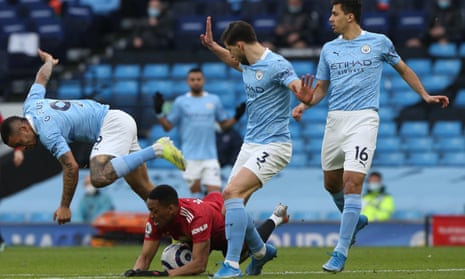It is one defeat. It does not change the fundamental fact that Manchester City will win the league and look probably as well-positioned to win a quadruple as any side has at this stage of a season. There comes a point at which the precise number of wins in a row is irrelevant – the run ended at 21, but whether it had been 18 or 24, it would be a lot, far too many for most sides even to begin to contemplate. They remain a formidable team but they no longer appear invincible.
That happens. All teams have games when the breaks don’t quite go their way – although United were deserved winners on Sunday. All sides have bad days. After three months of good days, perhaps City were simply due one. But still, the manner of United’s victory at the Etihad will cause concern. We’ve seen this before: City rattled by a concession, vulnerable to balls in behind them, looking at a wall that opposes them with no real concept of where the door may be. When Pep Guardiola teams lose games, this is how they lose them.
When Real Madrid appointed José Mourinho in 2010, it was with a specific brief to stop Guardiola, to do whatever it took to end his reign of glory at Barcelona. The Portuguese achieved it, after two grimly attritional seasons of eye-gouging and press-conference warfare, winning the league and forcing an exhausted Guardiola into resignation. Yet it turns out that had they merely wanted to challenge him on the pitch, the ideal candidate was the man who succeeded Mourinho at Old Trafford: Ole Gunnar Solskjær. There have been 68 managers who have faced Guardiola on four or more occasions; since City won at Anfield last month to level the score against Jürgen Klopp, Solskjær is the only one to have a positive record against him – four wins and a draw from eight games.
His football, sitting men deep and looking to strike at pace on the counter, is not particularly sophisticated. It remains too dependent on brilliant individuals doing brilliant things at the right moment to bring sustained success. It can toil against well-organised and unambitious opponents (Crystal Palace, West Brom, Sheffield United). It will struggle against better sides who decide also to sit off (after a 6-1 defeat, a 1-0 defeat and five 0-0 draws, this was United’s first win against a “Big Six” side this season). But it can hurt teams who leave space in behind them.

Guardiola sides over recent seasons have been vulnerable to that. It’s how City lost twice to Wolves last season and to Norwich. For a while, that was how Guardiola teams lost in the Champions League, season after season. Then the cause of defeat became the attempts to prevent that kind of defeat: the weird team selections against Liverpool in 2018, Tottenham in 2019 and Lyon in 2020.
It’s what Guardiola seemed to have resolved this season. The 5-2 defeat at home to Leicester was a perfect example of how finely honed his side are and the problems that can cause: pulling one of the more advanced central midfielders deeper to offer additional protection to the back four left Kevin De Bruyne isolated in the press, allowing Youri Tielemans and Nampalys Mendy to pick their way around him with relative ease. This is why the calls for Klopp to ease back on his approach as Liverpool’s season collapses feel slightly misguided; when mechanisms are as precisely calibrated and interconnected as modern pressing systems are, enacting anything more than a minor tweak is hugely difficult.
But by late December, City seemed to have got it right: not just on their way to 21 straight wins, but only eight goals conceded during that run. The one doubt was whether City had really been tested in those games. That feels a slightly preposterous quibble, and that level of consistency is impressive almost irrespective of the opposition, but the nature of modern football and its absurd finance structures are that teams can embark on long unbeaten runs without ever really needing to play that well, especially if, as City did, they catch teams such as Chelsea, Tottenham and Liverpool at a low ebb.
And one moment in particular provoked a slight frisson of doubt: Liverpool’s penalty against City was soft, but it came from a simple ball in behind Rúben Dias. Was the old vulnerability still there? The answer on Sunday was emphatic: yes.
It was another past weakness that afflicted them initially, though, as they reacted badly to going behind to a first-minute penalty. The flipside of their selfless integration, particularly since the departure of Vincent Kompany, is a lack of on-pitch leaders to drag them through crises. It’s why, when things go wrong, Guardiola sides often concede in batches – two or three in a 10-15-minute period. Here they didn’t concede a second but the cogs were almost visibly sticking and it took until the midpoint of the half before they rediscovered their usual rhythm. But even then, they were open to the counter. In fact, United had sufficient chances on the break to have won more comfortably.
It’s one game. The last three months have been hugely impressive and this defeat doesn’t change that. No revolution is ever entirely linear; there are always setbacks. But Sunday’s defeat does raise awkward questions about the extent to which City’s previous issues have really been resolved.

Comments (…)
Sign in or create your Guardian account to join the discussion